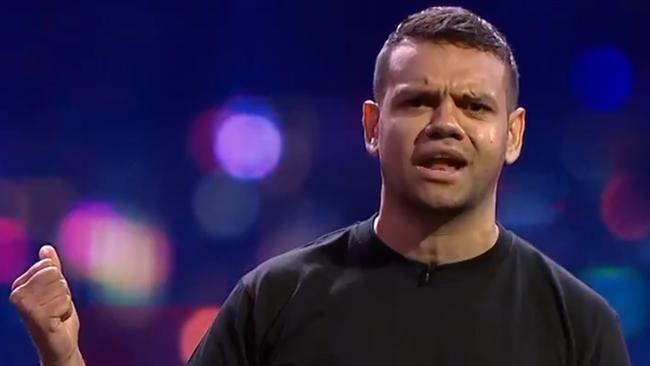‘Hard truths’ about indigenous rights in Australia on QandA
The ‘hard truths’ about indigenous rights in Australia were front and centre of the QandA debate.

The “hard truths” about indigenous rights in Australia were front and centre of the QandA debate on Monday night after tens of thousands of people rallied in Black Lives Matter protests around the country.
Leetona Dungay opened the discussion and demanded charges be laid on the police officers responsible for her son’s death custody in 2015.
Actor, writer and Gamillaroi and Torres Strait Islander woman Nakkiah Lui said police brutality towards Aboriginal people was the “tip of the iceberg” and Black Lives Matter has been an issue in Australia since the country was colonised.
“The bottom of the iceberg is that there are massive inequalities with Aboriginal lives … so when the Prime Minister says this is a wonderful country you know it’s tone deaf and disrespectful,” Ms Lui said.
Writer, actor and Wongutha-Yamatji man Meyne Wyatt said institutions “were killing” indigenous people.
“We are demanding justice … I am sick of talking about peaceful because peaceful protests don’t work,” Mr Wyatt said.
Leetona Dungay asks the panel to stand with her in demanding charges be laid on the police officers responsible for her son’s death custody in 2015. #QandA pic.twitter.com/H0GvMTWONf
— QandA (@QandA) June 8, 2020
Mother of an indigenous teenager who was arrested in Sydney after he allegedly told a police officer “I’ll crack you in the f..king jaw, bro” appeared on the program to ask the panel if “police should investigate police”.
The police officer kicked the teenager's legs out from under him, heavily threw him into the ground and arrested him.
In response, opposition Treasury spokesman Jim Chalmers said progress on indigenous rights is “lacking” in will and “commitment”.
“My commitment is to implement, in full, the Uluru Statement from the Heart and to progress the agenda that has been laid down about deaths in custody,” Mr Chalmers said.
Are police officers called in to deal with social issues that fall outside the legal and criminal justice system too often? #QandA pic.twitter.com/rHFKaWLEU1
— QandA (@QandA) June 8, 2020
Commercial litigator and community advocate Nyadol Nyuon said the relationship between police and particular communities was “very problematic”.
“I think in this area of police reforms, there is a lot that can be done, including, in my view at least, the independent investigation of misconduct,” Ms Nyuon said.
By allowing the protests to run, have Premiers and Chief Health officers risked the health, welfare and economy of the country? #QandA pic.twitter.com/ccaUcRndfy
— QandA (@QandA) June 8, 2020
The next question for the panel asked why premiers and chief health officers allowed the protests to go ahead given the strict COVID-19 restrictions in place to prevent further outbreaks.
Ms Lui said indigenous people had demanded equality “numerous” times to no avail.
“We might find a vaccine for the pandemic, but racism has been something that this country is founded on, and we haven't fixed that,” she said.
“The last time I checked, Australia doesn't have a death sentence, but it does for Aboriginal people.”
Aside from financial remuneration, how will the Government account for the long-term suffering and pain that the Robodebt bungle caused? #QandA pic.twitter.com/JCOVq5QFFP
— QandA (@QandA) June 8, 2020
The conversation pivoted to robo-debt when NSW Liberal senator Andrew Bragg was asked if the government would recognise the hardship people faced as a result of the unlawful scheme.
“That was a flawed scheme and has now been withdrawn, and people are going to be refunded,” Senator Bragg said.
Mr Chalmers said the least the government could do was “apologise”.
“I think after a government has been sprung illegally taking money from people like Glen, the least they could do is apologise,” he said.
Andy says “over budget is better than under budget.†Should the Government be criticized for the $60 billion JobKeeper mistake when it has successfully managed the crisis of a pandemic in Australia? #QandA pic.twitter.com/Ioh4liljDD
— QandA (@QandA) June 8, 2020
Key government COVID-19 policies were then debated when Mr Chalmers conceded that the JobKeeper program was “a really good idea” but said it was “really badly implemented” after it was revealed an administrative error revised the cost of the program down by $60 billion.
“If you are genuine about trying to make sure that the unemployment queues don't get even longer than they need to be, then implement your program right,” he said.
Why is the $25,000 homebuilder package not scalable for cheaper upgrades? #QandA pic.twitter.com/g9bPAxuWlF
— QandA (@QandA) June 8, 2020
Senator Bragg defended the government’s HomeBuilder scheme and said the program was designed to create demand in the construction sector but admitted the commitment to a $150,000 renovation created a “disparity”.
“It's designed to create demand across the economy. And in many states, like NSW and Victoria, where there is a real need to move on demand now, this package, I think, will obviously have high take-up,” he said.
The Chinese Government has issued advice to its people not to travel to Australia due to possible racial discrimation? Is this advice based in fact? #QandA pic.twitter.com/UoyQ6dchg9
— QandA (@QandA) June 8, 2020
The final question asked the panel to consider advice China issued to its citizens that they should not travel to Australia because of racism towards Chinese people during the pandemic.
Ms Nyuon said the “attacks” on some Chinese Australians were “undeniable”.
“Racism can be a daily experience for people of colour in this country,” she said.
“I know that's an uncomfortable truth to say.”
Meyne Wyatt closes #QandA with a monologue from his play, City of Gold. pic.twitter.com/9ALFIYRAnq
— QandA (@QandA) June 8, 2020




To join the conversation, please log in. Don't have an account? Register
Join the conversation, you are commenting as Logout